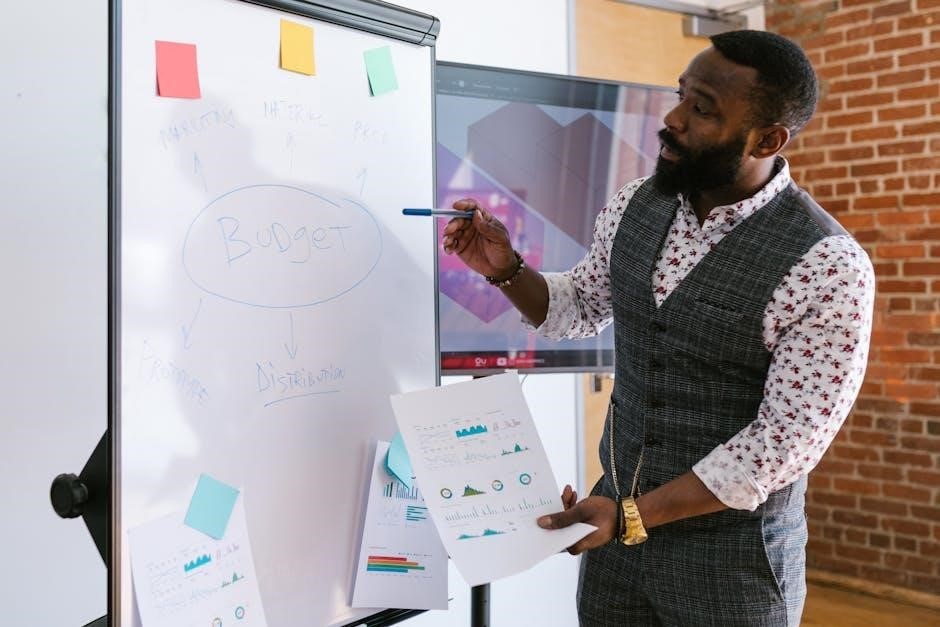The growth mindset, introduced by Carol Dweck, emphasizes that abilities and intelligence can be developed through effort and learning, fostering resilience and success in personal and professional realms.
What is the Growth Mindset?

The growth mindset, as outlined in Carol Dweck’s groundbreaking work, is the belief that abilities, intelligence, and talents can be developed through dedication, effort, and persistence. Unlike a fixed mindset, which assumes these qualities are innate and unchangeable, the growth mindset embraces challenges as opportunities for growth and learning. It fosters resilience, creativity, and a love for learning, enabling individuals to overcome obstacles and achieve their full potential. This concept, detailed in Dweck’s book Mindset: The New Psychology of Success, has transformed how people approach personal and professional development. By adopting a growth mindset, individuals can unlock their potential, adapt to change, and thrive in an ever-evolving world.
Why is the Growth Mindset Important?
The growth mindset is crucial as it empowers individuals to embrace challenges, persist through failures, and view effort as a path to success. It fosters resilience, creativity, and a love for learning, which are essential in today’s fast-paced, competitive world. By believing that abilities can grow, people are more likely to take risks, seek feedback, and push beyond their perceived limits. This mindset not only enhances personal growth but also improves relationships and professional success, as documented in Carol Dweck’s Mindset: The New Psychology of Success. It encourages a culture of collaboration and innovation, making it a vital tool for overcoming obstacles and achieving long-term success in both personal and professional spheres.

Carol Dweck’s Contribution to the Growth Mindset
Carol Dweck revolutionized psychology by defining the growth mindset, showing how embracing challenges and effort leads to success, as detailed in her influential book.
Overview of “Mindset: The New Psychology of Success”
In her groundbreaking book, Mindset: The New Psychology of Success, Carol Dweck introduces the concept of fixed and growth mindsets, reshaping how we view intelligence and ability. She explains that individuals with a fixed mindset believe their talents are innate and unchangeable, while those with a growth mindset see challenges as opportunities to learn and grow. Through real-life examples and scientific research, Dweck demonstrates how adopting a growth mindset can lead to greater success and fulfillment in personal and professional life. The book provides actionable strategies for cultivating resilience, overcoming obstacles, and achieving potential, making it a must-read for educators, professionals, and anyone seeking self-improvement.
Fixed Mindset vs. Growth Mindset: Key Differences
A fixed mindset assumes abilities and intelligence are innate and unchangeable, leading to a focus on proving oneself. In contrast, a growth mindset believes talents can be developed through effort and learning. Those with a fixed mindset fear challenges, viewing them as threats to ego, while individuals with a growth mindset embrace challenges as opportunities for growth. Fixed mindsets prioritize success, while growth mindsets emphasize learning and progress. This fundamental difference shapes how people handle failure, with fixed mindsets often discouraging persistence and growth mindsets fostering resilience. Understanding these distinctions is crucial for personal development and achieving long-term success in various aspects of life. Carol Dweck’s work highlights how these mindsets influence behavior and outcomes, offering insights into fostering a growth-oriented approach.
The Science Behind the Growth Mindset

The growth mindset is rooted in psychological research, particularly the work of Carol Dweck, who demonstrated that beliefs about intelligence and ability significantly impact behavior and performance. Neuroplasticity, the brain’s ability to reorganize itself through practice and learning, supports the idea that abilities can be developed over time. Studies show that individuals with a growth mindset exhibit increased activity in brain regions associated with cognitive development and problem-solving when facing challenges. This mindset fosters resilience, as setbacks are perceived as opportunities for growth rather than failures. Dweck’s research highlights how adopting a growth mindset can enhance motivation, effort, and overall achievement, making it a powerful tool for personal and professional development. The scientific foundation of the growth mindset underscores its transformative potential across various domains of life.

Benefits of the Growth Mindset
The growth mindset fosters resilience, enhances motivation, and encourages continuous improvement, leading to personal and professional success by embracing challenges and viewing effort as a pathway to growth.
Personal Growth and Self-Improvement
Cultivating a growth mindset is a powerful tool for personal growth and self-improvement. By believing that abilities can be developed through dedication and hard work, individuals unlock their potential to overcome obstacles and achieve their goals. This mindset encourages resilience, as challenges are viewed not as insurmountable barriers but as opportunities to learn and grow. The growth mindset also fosters self-awareness, allowing people to identify areas for improvement and take proactive steps toward self-development. Over time, this approach leads to increased confidence, a more positive outlook on life, and the ability to continuously evolve and thrive in both personal and professional settings. Embracing this mindset is a journey toward lasting fulfillment and success.
Impact on Education and Learning
The growth mindset has transformed education by reshaping how students and educators approach learning. By emphasizing effort over innate ability, it fosters resilience and a love for challenges. Students with a growth mindset view failures as opportunities to learn, leading to improved academic performance and higher engagement. Teachers who adopt this mindset create supportive environments, praising effort rather than just results, and encouraging students to take risks. This approach has been shown to particularly benefit students from disadvantaged backgrounds, helping to close achievement gaps. Educators like Marva Collins have demonstrated how applying growth mindset principles can lead to remarkable student progress. By focusing on potential rather than limits, the growth mindset empowers learners to unlock their full capabilities and thrive in educational settings.

Professional Development and Success
A growth mindset is a powerful tool for professional development, enabling individuals to adapt, innovate, and thrive in dynamic work environments. By believing that abilities can be developed through effort, professionals embrace challenges as opportunities for growth. This mindset fosters resilience, leading to greater job satisfaction and career advancement. Organizations that cultivate a growth mindset among employees promote a culture of continuous learning, collaboration, and innovation. Leaders with a growth mindset inspire their teams to take risks and view failures as stepping stones to success. As highlighted in Carol Dweck’s work, this approach not only enhances individual performance but also drives organizational success, making it a cornerstone of modern professional development strategies.
Practical Applications of the Growth Mindset
The growth mindset is practically applied in education, project management, and personal growth, fostering collaboration, resilience, and innovation in various real-world scenarios and industries.

Growth Mindset in Education: Teachers’ Perspectives
Teachers increasingly embrace the growth mindset to foster resilience and collaboration in students. By emphasizing effort over talent, educators create environments where challenges are seen as opportunities for growth. Many educators incorporate growth mindset principles into their teaching strategies, such as using process praise and presenting topics in a growth framework. This approach helps students develop a sense of agency and confidence. The growth mindset also supports equity in education, as it helps students from diverse backgrounds overcome barriers. According to research, teachers who adopt this mindset often see improved academic performance and increased student motivation. The growth mindset is not just a theory but a practical tool that educators use to empower students and help them thrive academically and emotionally. It has become a cornerstone of modern educational practices, transforming how teachers engage with their students and the learning process.
Growth Mindset in Project Management
The growth mindset is transforming project management by fostering learning, agility, and collaboration. Leaders who embrace this approach encourage experimentation, viewing challenges as opportunities for growth rather than obstacles. A growth mindset promotes resilience, allowing teams to adapt to changes and learn from setbacks. It also cultivates a culture of continuous improvement, where feedback is valued and innovation thrives. In contrast to a fixed mindset, which fears failure and avoids risks, the growth mindset drives teams to embrace uncertainty and strive for excellence. By fostering a growth mindset, project managers can build more adaptable, innovative, and successful teams. This approach is increasingly recognized as a key factor in delivering resilient and groundbreaking projects in today’s fast-paced environment.
Cultivating a Growth Mindset
Embrace challenges and view them as opportunities for growth. Practice self-awareness, persistence, and learning from feedback to nurture resilience and continuous improvement in personal and professional life.
Step-by-Step Guide to Developing a Growth Mindset
Acknowledge and Challenge Fixed Mindset Thoughts: Identify when you believe your abilities are fixed and replace these thoughts with a growth-oriented perspective, emphasizing effort and learning.
Embrace Challenges: View obstacles as opportunities for growth rather than threats to ego, fostering resilience and creativity in problem-solving.
Practice Self-Awareness: Regularly reflect on your mindset, recognizing moments of fixed thinking and consciously shifting toward growth.
Seek Feedback and Learn from Criticism: Use constructive criticism to improve, understanding that feedback is a tool for development.
Celebrate Effort, Not Just Success: Recognize and appreciate the effort invested in tasks, reinforcing the value of persistence and progress.
Develop a Growth Mindset Routine: Incorporate daily practices like journaling or affirmations to maintain and strengthen your growth mindset over time.

Embracing a growth mindset transforms challenges into opportunities, fostering resilience and lifelong learning. Carol Dweck’s insights, available in her book, empower individuals to unlock their full potential.
Final Thoughts on the Growth Mindset

The growth mindset, as explored in Carol Dweck’s seminal work, offers a transformative approach to personal and professional development. By believing that abilities can be cultivated through effort, individuals unlock their potential for resilience, creativity, and success. This mindset not only reshapes how we view challenges but also fosters a culture of continuous learning and collaboration. Dweck’s insights, supported by decades of research, provide actionable strategies for educators, leaders, and individuals to embrace growth over stagnation. The impact of this mindset extends beyond academics, influencing professional success and personal well-being. Ultimately, the growth mindset is a powerful tool for overcoming obstacles, achieving fulfillment, and thriving in an ever-evolving world.